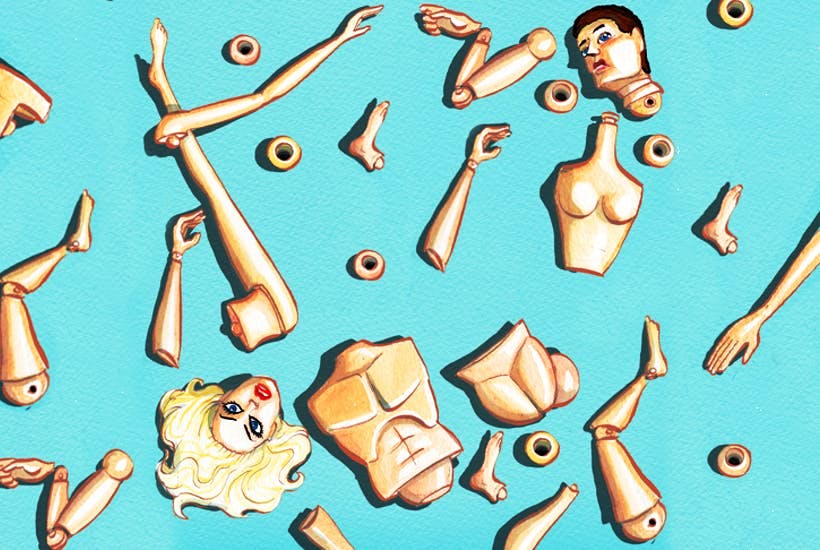I’m bored with writing about politicians so this is an article about genitals instead.
Feel free to make your own jokes about the sentence above, but I promise what follows is not funny. You could not, as the old phrase goes, make it up.
Most of us, I think, like to see ourselves as tolerant and open-minded. Live and let live is the prevailing social attitude of our times. For all the division and acrimony in political debate and online, British society is, by international and historical standards, strikingly liberal and tolerant.
This is a good thing. People should not face abuse or exclusion or hostility because of who or what they are; we all should be judged on what we do.
The eternal question of tolerance is how far it extends. We are all familiar with the old debates about whether toleration requires accepting acts of intolerance that you find distasteful, but that’s not what this article is about. It’s about whether toleration requires accepting genitals that you don’t fancy.
And yes, this relates to transgender people and the notion of transphobia.
A lot of institutions, companies and organizations are terrified of being seen to be transphobic. Even the allegation, however baseless, that someone discriminates against others on the grounds of their gender can cause enormous harm to a reputation.
So keen are public bodies to avoid this fate that they overstep the relevant laws. The UK’s Equality Act says you can’t discriminate against someone because of either their sex (whether they are anatomically male or female) or their ‘gender reassignment’ (such as when a person born male decides to ‘live as a woman’). But quite a lot of councils and other public bodies routinely ignore physical sex and base their work solely on questions of the social concept of ‘gender’.
That’s a problem, and not just because it ignores the law. It’s a problem because it overlooks the physical differences between people born male and people born female. Those differences exist and they matter, for reasons that I hope don’t need setting out here.
After all, most people instinctively understand those differences, because those physical differences are not just a foundation of how societies have organized themselves, they are the basis of sexuality and sexual attraction.
This is, again, something I hope I don’t have to spell out too clearly, but I think most people would accept that when it comes to sexual attraction and activity, anatomy matters: heterosexual people are sexually attracted to people who have different bodies and genitals to their own; homosexual people to those with the same.
But in the looking-glass world of transgender rights, the proposition I’ve just set out is contested and even controversial. For some people, reducing sexuality to a simple question of ‘genital preference’ is reductive, exclusionary and yes, transphobic.
How so? Well, consider the trans rights mantra that ‘trans women are women’. It means that someone who feels themselves to be a woman, who says they are a woman, is a woman, full stop. That person’s biology is irrelevant, because the idea of gender trumps the fact of sex. It’s not necessary or even common for trans women to have sexual reassignment surgery. Some women have penises: get over it.
That raises many questions, including about sexual attraction. If you’re a heterosexual woman attracted to men with male bodies and genitals, would you consider sex with a person who did not have such a body or such genitals? If you’re a man who is sexually excited by women with breasts and vaginas, would you be aroused by someone who had neither?
These aren’t quite the questions asked in a recent study published in the Journal of Social and Personal Relationships, but that’s what it boils down to. In the study, people were asked to imagine they were ‘single and looking’ and then to say which of the following they would consider as a ‘potential dating partner’: a cisgender woman; a cisgender man; a transgender woman; a transgender man; or a person with a non-binary gender identification. (‘cis’ means ‘not trans’. The simple fact that the study used the term is telling, since not everyone accepts the term.)
You might not be completely flabbergasted to learn that 87.5 percent of the respondents said they would only consider ‘cis’ people as potential sexual partners.
And if that was all the study and its authors had to say, I wouldn’t be writing about it: ‘dog bites man’ isn’t a story.
But one of the authors of that study wasn’t willing to confine herself to accurately and fairly reporting the results of that study.
That author is Karen Blair. To give her full bio, she is an Assistant Professor of Psychology at St Francis Xavier University in Antigonish, Nova Scotia; an Adjunct Professor of Psychology at Acadia University in Wolfville, Nova Scotia and Chair of the Sexual Orientation & Gender Identity Issues (SOGII) Section of the Canadian Psychological Association.
In a blog, Blair has been pondering her findings and what they tell us about how tolerant we are. She doesn’t seem happy that most people wouldn’t consider dating a trans person, or, as she puts it, would ‘exclude’ them from their pool of potential romantic partners.
Refusing to consider dating trans people, Blair suggests, contributes to trans people suffering mental and physical harm:
‘What then, does this mean for trans people’s overall well-being if the majority of people within society won’t even consider them as potential dating partners under hypothetical conditions? A lack of social support could contribute to some of the existing discrepancies in mental and physical well-being within trans communities.’
Why might people be reluctant to consider dating trans people? Blair doesn’t know, because her study didn’t ask them. But that doesn’t stop her speculating. It’s because of prejudice and ignorance, she says:
‘…exclusion was likely the result of factors ranging from explicit transprejudice, such as viewing trans persons as unfit, mentally ill, or subhuman, to a lack of understanding or knowledge about what it means to be a transgender man or woman.’
And what does Blair suggest we all do about this? The — delicately implied — answer might not surprise you:
‘Ultimately, each individual has the freedom to decide whom they date or are interested in dating, and thus the article does not suggest that any single individual must include trans people within their dating pool. However, the article does suggest that examining and following the overall societal patterns of including or excluding trans people within the intimate realm of dating can be used as an indicator of overall acceptance and social inclusion of trans people.
‘In other words, it is one thing to make space for trans people within our workplaces, schools, washrooms, and public spaces, but it is another to see them included within our families and most intimate of spaces, our romantic relationships. We won’t be able to say, as a society, that we are accepting of trans citizens until they are also included within our prospective dating pools; at the very least, on a hypothetical basis.’
Got that? Toleration doesn’t just mean treating transgender people fairly and equally, ensuring they have the same rights, freedoms and entitlements as anyone else. It means being willing to have sex with people, not on the basis of the body and genitals they have, but because of the gender they say they are.
It means that straight men who exclusively seek sexual partners with vaginas should instead expand their ‘prospective dating pool’ to include people who describe themselves as women and just happen to have penises. It means that lesbians who incline towards sex with people who have vaginas, also need to widen their horizons and be open to sex with women who have penises.
And if you’re not prepared to have sex with a transgender person, you’re contributing to a transphobic social climate that causes real mental and physical harm to trans people. If you want to be really progressive and inclusive, you know what to do.
Here, a thought experiment is in order. Try to imagine this line of argument being pursued in a different context, away from the transgender debate.
Imagine someone making a serious and sustained argument of the following sort:
‘Here is a group of people. You say you aren’t willing to consider having sex with them. That means you are causing those people real harm and you are a bad person. You should put aside your reservations and reconsider having sex with them.’
What would we think about that argument? What words would we use to describe these notions and the people who promote them? I leave it to others to answer that question.
Here’s another question. So what? Is one short, silly blog by a non-famous junior academic worthy of attention? I think so. Blair’s blog was published by Cambridge University Press, an offshoot of one of the world’s great universities. Blair has made similar points in Psychology Today too.
Like it or not, that matters. It lends weight, legitimacy. If it’s OK to say this stuff at Cambridge University Press or in Psychology Today, it’s OK to say it in other places too. This is how the window of what is acceptable to discuss moves. This is normalization.
I recently spoke to a lesbian friend who is active in the UK Labour party who said that she routinely comes under social, and sometimes quite explicit, pressure from ‘progressive’ friends to sleep with trans women. ‘I’m sick of being told I should like penis. I don’t like penis. That’s why I’m a lesbian. That’s the whole point,’ she said.
Since I started writing about sex and gender last year, I’ve had a lot of conversations with women – and a few men – who say they worry that some of the people promoting transgenderism are advocates of ‘queer theory’, and are engaged in a quite deliberate attempt to break down societal norms and barriers in order to make it a lot easier for people with penises to put those penises into a much greater range of people than is currently permitted.
I generally view that worry with a fair bit of skepticism; it all sounds a bit far-fetched and even conspiratorial. But then I read things like Karen Blair’s blog, and I wonder.
This article was originally published on The Spectator‘s UK website.

























